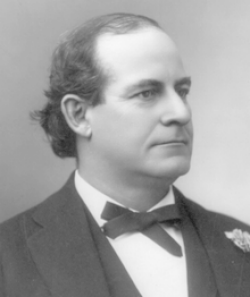XKCD has produced an amazing graphical history of the United States Congress viewed through the lens of the DW Nominate system of evaluating politicians’ ideological positioning. There are also some editorial comments, one of which touches on my obsession of monetary policy and the strange way it’s vanished from partisan politics:
The late 1800s saw an obsessive focus on the issue of bimetalism that it took me a while to understand.
Farmers and poor people who owed money favored a dual gold-silver standard, because it would lead to inflation, which would make debts easier to pay off. Wealthy bankers—who owned that debt—wanted the opposite. This became the focus of a Main St. vs. Wall St. cultural struggle culminating in William Jennings Bryan’s famous “Cross of Gold” speech. (Despite his fiery oratory, Bryan lost the presidential election to McKinley)
I’ve come to see this as mostly a great example of how monetary issues have always been processed poorly by the political system. In the long run, money is neutral and whether you run a faster or slower inflation rate has nothing to do with anything. In the short run, an unexpected shift in the price level does have important distributive implications between debtors and creditors. But this is a very short run effect. In general, faster inflation leads to higher nominal interest rates—bankers aren’t suckers.
The much more important short-term impact is on the overall level of real production. The expansion of 1933-34 after FDR ditched gold was, in the aggregate, good for rich and poor alike while the deflationary Great Depression of 1929-32 was bad all around.
But what ultimately proved politically decisive was neither the important question of the output gap nor the less important question of debtor-creditor redistribution. Instead the campaign became something of a culture clash in which Bryan engaged in broad disparagement of urban economies:
You come to us and tell us that the great cities are in favor of the gold standard. I tell you that the great cities rest upon these broad and fertile prairies. Burn down your cities and leave our farms, and your cities will spring up again as if by magic. But destroy our farms and the grass will grow in the streets of every city in the country.
Conversely, McKinley won in the end with the votes not just of industrialists but also many factory and railroad workers. And part of the story here is that people suffered then, as now, from money illusion. People see that expansionary monetary policy leads to higher nominal prices for primary commodities (food and, these days, gasoline) and therefore see monetary expansion as a form of higher earnings for commodity producers and lower incomes for wage earners. Back before World War II when there were a lot of farmers in America that meant there was a consistent political constituency for expansionary monetary policies. But this has always been a confused way of looking at monetary policy. A drought or an oil-supply disruption lowers the real incomes of wage-earners while boosting the real incomes of the remaining commodity producers, but these are supply-side issues not monetary policy issues. Monetary policy, pursued consistently, is totally irrelevant to this question of cities versus the countryside or the affordability of gasoline but those are the issues that dominate monetary politics.
